💼Case Management
All that you ever wanted to manage your cases. Fieldworker is the perfect solution whether you are a Guandianship agency, or work with students
Today’s governments are responsible for providing several essential services to the public, including health, financial, and family support. For most people, completing the multiple application forms and navigating the complex benefits process would be difficult, if not impossible, without the aid of a case manager.
However, many case management offices are understaffed, use outdated technology, and have lengthy workflows, which are hindering their ability to improve health outcomes and provide timely and critical service. Therefore, case workers desperately need solutions that enhance and streamline their work environment.
Digitize cumbersome and lengthy manual paper processes
Caseworkers typically spend 60 to 70 percent of their time on case-related activities, including administrative tasks such as paperwork, which only allows them to spend 20 to 35 percent of their time with families and community resources.
Collect accurate and complete case data, which often results in fewer errors and rework
Manage the countless number of documents health providers, parents, and guardians submit online, regardless if they are remote or in the office
Collaborate with other agencies and providers on case plans and service requests
Expand the availability of mobile-friendly tools to engage with families
Online application forms make it possible to securely complete and sign an application without the need of a printer or physically coming into an office.
Mobile accessibility makes it easier for anyone who does not have a desktop computer to find, sign and submit information from their mobile device.
Centralize the management of digital case files
Create a single source of truth for standardized forms to ensure the wrong documents are not used
Provide a court-admissible document repository and audit trail that can be quickly and easily reviewed
Make it easier to monitor and ensure the correct documents have been completed and submitted according to local, state, and federal policies and procedures.
Case Management using Fieldworker
https://www.archives.gov/records-mgmt/policy/electronic-signature-technology.html
A case management system stores your client information in one place, making it easy to:
Increase productivity. Streamline data input and operations management with case management software. That way, your staff can log activities, make notes, delegate tasks, and schedule events within the same intuitive interface.
Create reports. Client progress and other metrics can be easily tracked and displayed using the reporting tools in case management software. This gives managers and other senior employees an overview of how the agency is performing and helps pinpoint opportunities for improvement.
Collaborate between caseworkers. Information in the management system is automatically made accessible to employees working on a case, allowing for increased accountability and effective collaboration between different teams or departments.
Reach out to clients. Caseworkers can communicate directly with their clients using their case management software. These communications are automatically tracked, so you never have to worry about missing important details.
With case management software, you’ll spend less time keeping track of your tasks, lists, notes, and deadlines, and more time on building meaningful connections with your clients.
Maintaining accurate and comprehensive social service client records is paramount in the social and human services sector. These records provide crucial insights into clients' backgrounds, needs, and progress, enabling you to deliver effective support and interventions. Case management in Fieldworker is supported using the following company structure.
Admin - Owner or the administrator for the agency
Case Manager - The health and human services professional is responsible for coordinating the overall care delivered to an individual client or a group of clients, based on the client’s health or human services issues, needs, and interests.
Clients - Customers with at least one or more project, generally tied up with a specific payer
The recipient of case management as well as health and human services. “This individual can be a patient, beneficiary, injured worker, claimant, enrollee, member, college student, resident, or health care consumer of any age group. In addition, [use of] the term client may also infer the inclusion of the client’s support [system]” (CMSA, 2016, p. 32).
Contacts - The person or persons identified by each individual client to be directly or indirectly involved in the client’s care.
It “may include biological relatives [family members], a spouse, a partner, friends, neighbors, colleagues, a health care proxy, or any individual who supports the client [caregivers, volunteers, and clergy or spiritual advisors]” (CMSA, 2016, p. 32).
A company engaged in case management or other related areas, such as Guardianship, may identify itself as a ‘Case Management’ line of business.
Examples of Client Sources
Payor-based case manager
May implement the Case Management Process for a client upon direct contact via the telephone by the client/support system or upon referral from other professionals working for the payor organization such as a medical director, a claims adjuster, a clerical person, or a quality/performance improvement specialist.
Acute care setting-based case manager
May implement the Case Management Process for a client after a referral from any of the healthcare team members, including the physician, primary nurse, social worker, consultant, specialist, therapist, dietitian, or manager.
In some organizations, case managers may visit every new admission and conduct a high-level review of the client’s situation for the purpose of identifying whether the client would benefit from case management services.
Community care setting-based case manager
May implement the Case Management Process for a client after a referral from the primary care provider or specialty care provider.
In some instances, the case manager may initiate the process based on a request from the client/support system or based on a regulatory obligation such as a health home requirement for Medicare or Medicaid beneficiaries participating in an accountable care organization or federally qualified health care center.
Vocational rehabilitation or workers’ compensation-based case manager
May implement the Case Management Process for a client after a referral from the acute- or community-based case manager or other healthcare providers who have identified the client would benefit from vocational rehabilitation case management services.
In some instances, an employer may refer a client (e.g., an on-the-job injured worker) for vocational rehabilitation as part of the return-to-work plan of care.
The Importance of Maintaining Accurate and Comprehensive Client Records
Social service client records serve as your comprehensive guide, painting a multi-dimensional picture of each individual under your care. It sharpens your understanding of clients' needs, bolsters informed decision-making, enables personalized care plan formulation, and fosters accountability and transparency.
Components of a Social Service Client Detail
A comprehensive social service client record in the Fieldworker includes the following components:
Demographic information: This includes basic information about the client, such as their age, gender, ethnicity, and language preference.
Referral and intake information: This involves initial details about the client's situation, who referred them, and why they need support.
Service history: This part of the record documents every interaction between the client and the service providers. It provides valuable insights into the client's journey.
Assessment and evaluation: These are the results of any assessments or evaluations conducted to understand the client's needs and capabilities.
Service plans and goals: This component outlines the client's tailored support plan, including their short-term and long-term goals.
Progress notes: These are regular updates about the client's progress and response to interventions.
Consents and releases: This contains all documentation of the client's consent to services and release of information, ensuring legal compliance.
Documentation of events and incidents: This section logs any significant events or incidents that could impact the client's journey.
Closure and transition: This information concerns the end of services, reasons for the closure, and any transition plans.
Several of these items are organized in the document center. The Fieldworker platform allows your agency to find the best organization for your processes.
The Case Management Process: Implementing (Care Coordination)
A case manager in the app has a new home or landing screen. This screen will show all major information, generally required for efficient operations.
Upcoming appointments
Timekeeping
Last N notes
The case manager also has access to all functionalities to add new customers, projects, or family members, etc.
For any company that has its primary line of business as ‘Case Management’, create a new role, ‘Case Manager’, to access the functionality discussed here.
This would allow the intake process to be completed by any case manager. For now, the data collected by the intake process is online with the support coordination business in New Jersey. Fieldworkers can be customized for any specific intake process or reporting, as needed.
The ISP, or comprehensive plan, can be added as a document and attached to either the customer and/or to a project.
The Fieldworker app allows case managers to capture all case notes and retrieve them either for a specific project/year or by the client. The notes may be edited, as needed, to update/enhance with details.
A new note may also be added via the New option.
The existing notes may be edited if needed.
Case managers also have access to the tasks that have been completed to see the associated details.
Task management helps your teams achieve goals, collaborate, and share knowledge to accomplish better customer outcomes. Using FieldWorker, your agency can implement best practices and make it easy for employees to track their tasks throughout the monitoring cycle.
Tasks are the basic units of work that can be defined, assigned to various employees, tracked for completion, and then presented for billing, claims, and other regulatory activities. Tasks allow the team to track time to the specific work they’re doing for the project. A set of tasks on the project, by default, is known in FieldWorker as common tasks. If you have other types of tasks that we currently don't capture, please let us know so that we can make any updates needed!
Employees can see their allocated tasks on their dashboard and start the task with an easy single-click check-in/out.
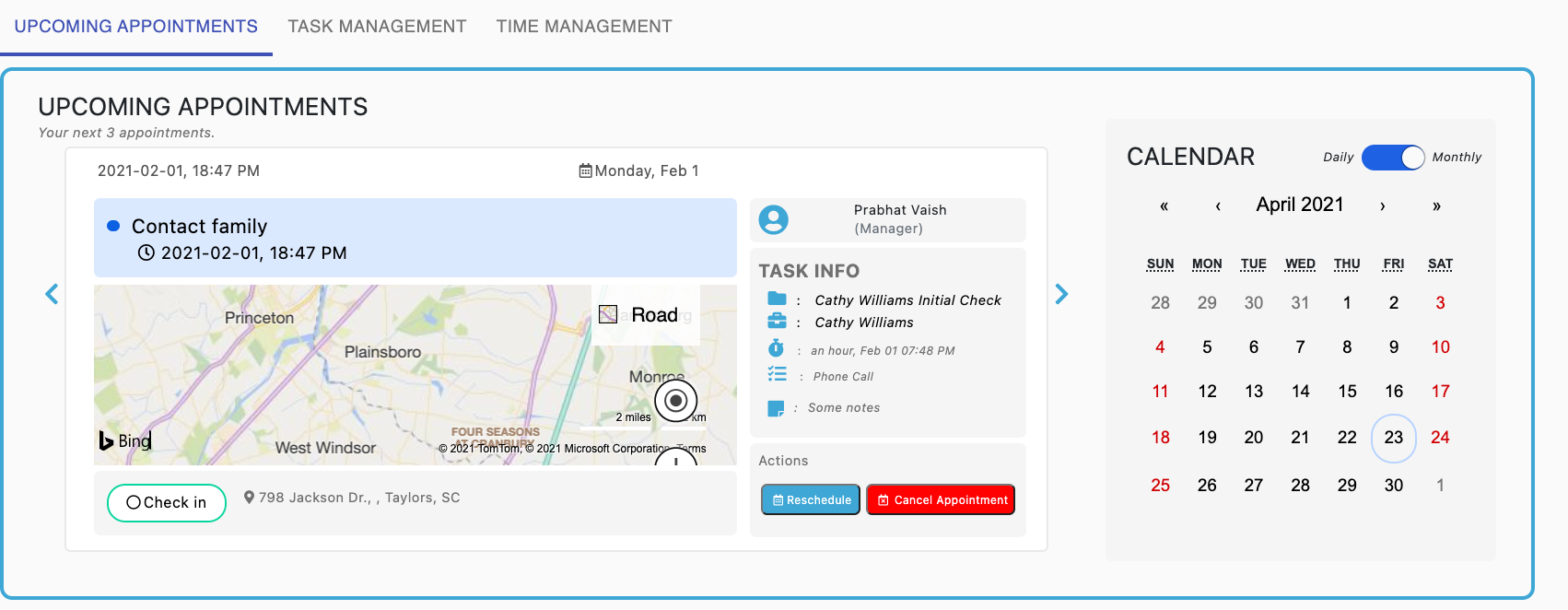
Employees can filter tasks across projects, change status, update checklists, and post comments. They may also re-assign tasks to other team members.
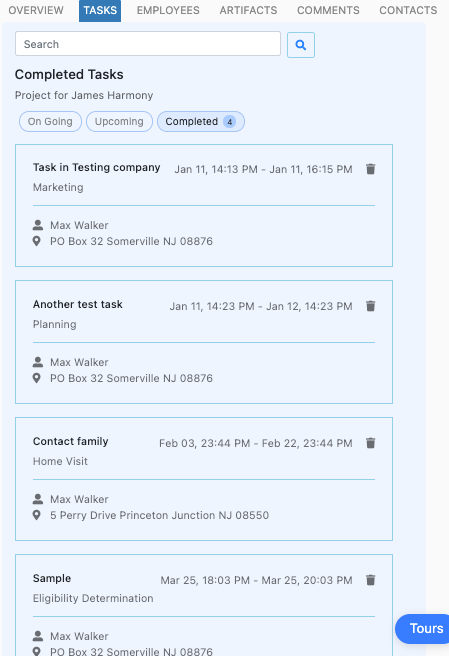
A task completed automatically creates a timesheet entry for the support coordinator. This is highly efficient for management, saves time for employees, and ensures flawless accounting of resources.
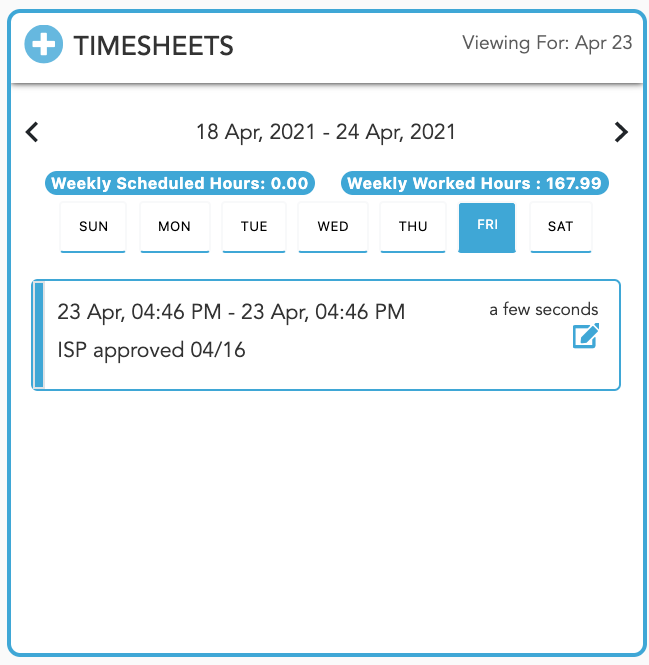
An admin or a manager usually creates and assigns tasks to various support coordinators. An SC may also create a task for their own projects. FieldWorker also allows agencies to define their own monitoring process and have it implemented and managed automatically. This is available as a custom implementation feature.
The most common way to create tasks (for admin and manager users) is by selecting New Task from the left sidebar menu.
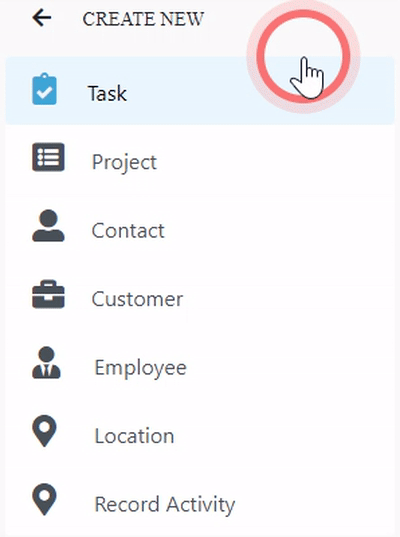
The following items are associated with a task at the time of creating a new task. Fieldworker allows several different ways to create a new task. An admin or a manager can create a new task, using New =>> Task, from the left navigation bar.
,A task title (This is normally used to consistently name the task, as needed by the agency). This is a mandatory field and should be completed for all new tasks. Generally, a mandatory field is indicated by an asterisk and is checked for completion when saving the task.
Task description with details about the task. This is a mandatory field.
Project for which this task is being created. This is a mandatory field.
Select if there is a prerequisite task that should be completed prior to this task
Indicate if the task requires a signature as proof of delivery (or completion)
The type of the task (this is used to determine adherence to DDD monitoring expectations). This field is also used by the system to initiate the appropriate medium i.e., phone call or telehealth session. This is a mandatory field. Fieldworker supports customization by allowing the definition of new task types to perfectly match your business process.
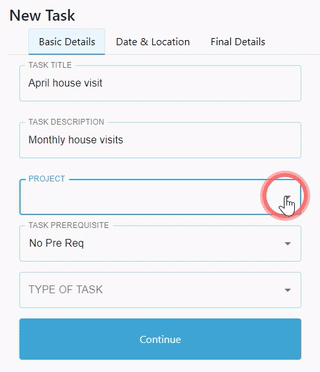
All scheduled tasks in Fieldworker have an expected time, location, and deadline for completion. This information is available on each employee's dashboard. A task may be initiated at one location and completed at another location. The Fieldworker allows up to three locations to be associated with a task.
Tasks can only be scheduled within the validity of the project duration, as defined while creating the project. All locations associated with the selected project are available as choices to perform the task.
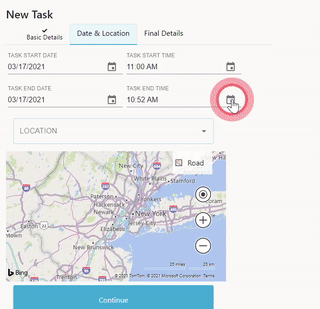
Finally, the task should be assigned to an employee with a specific priority. An agency admin may establish their own policies around the prioritization of various tasks.
Detailed notes, if needed, may be added to the task to help in execution. These comments are accessible from the task as well as the project panels.
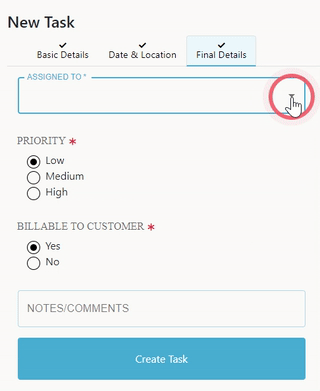
Case managers also have access to the default Fieldworker customer and project page functionality.
Your tasks
You can see a summary of your own tasks from the Home section on both the web and mobile.
Here, you'll be able to see all of your appointments and tasks for today, with the option to view all should you wish.
Under "Projects", you can also select a specific project and view all related tasks for that project under the "Tasks" tab.
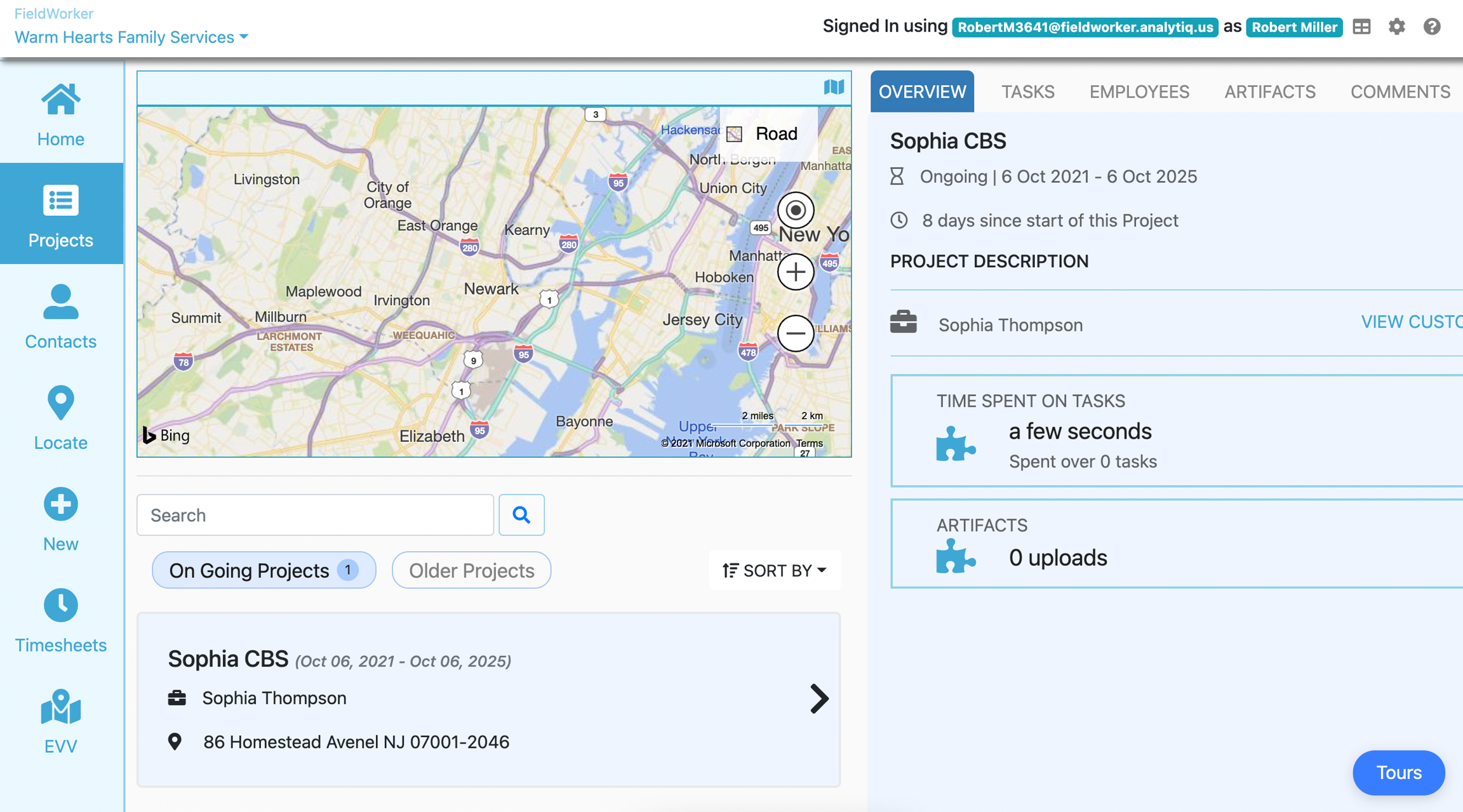
Your team's tasks
If your FieldWorker account is set to the manager or admin role, you'll be able to view an overview of tasks for your teams in these same places.
Additionally, in the home section, you'll be able to see a clearer overview under the "Task Management" and "Time Management" tabs. Here, you can easily filter in a variety of different ways, including by employee, to see the status of all tasks one specific member of your team is working on.

A new case (client or customer) page will be separately developed to provide a more relevant view for the case managers. (TBD)
In addition, FW will offer the following standard reports for case managers. These reports are generally aimed at
Build a clear case for funding
Communicate your mission’s value proposition
Comply with funding requirements
Make operational changes to improve performance
Maintain mission focus with empirical data
Build curiosity with data across the organization
Clients
All your client information is in one place

Case Notes
Quicker to capture and always up-to-date, leading to happier clients and more referrals
How much time does your team spend on case notes on average? Not only can it take a long time, but sometimes they are not updated regularly enough, leading to essential information about clients falling through the cracks.
FieldWorker leverages technology to make case notes fit your busy schedule
Voice-to-text for quicker case notes
Don't have time to sit down and type out an update? No problem. We've included cutting-edge voice-to-text technology in our app, meaning you can dictate your case notes, check over the transcription, and continue with your day.
Flexibility to suit your needs
By being able to dictate case notes, it's much easier to keep records up-to-date. Indeed, you can even make quick updates in between visits outside of the office. Prefer typing? Go for it! You can also type up case notes in our app, meaning you don't have to wait to get back to your desk to write updates.
Better case notes mean happier clients
Any time you save on updating case notes, you can spend with your clients. Plus, with reliably up-to-date records, you can always be assured that you have all the information you need to progress with them. That means happier clients, who are more likely to refer others to your agency.
Update Case Notes by Voice
Voice-to-text technology allows you to dictate updates to your case notes, making it quicker than ever before to make updates while on the go.
Audio Case Notes
Whether you would like to record the surroundings of a visit, or a client, or add your commentary in voice, or possibly have a confirmation of a service added to your visit, the fieldworker now allows you to add an audio note to your case, wherever a note is expected.
Your team will be able to see any updates in real-time, so you all have access to the most current info on every client.
You can update notes using the mobile app or the web, giving you flexibility and the ability to keep up-to-date from the field or from the office.
You will always be able to rely on your case notes, giving you what you need to work with your clients and meet their goals.
How to upload documents and images?
In the FieldWorker app, simply go to the "Artifacts" section in the side panel. This is where you can keep track of all your documents, in addition to viewing them within the details for individual tasks and projects.
Tap on the upload icon in the upper right-hand corner. Here, you'll see two options.
Under "Upload File", you'll have the chance to upload any documents and files.
Under "Take Picture", you'll be able to take a photo or upload a photo from your phone's library, for example, if you want to upload evidence of a printed document. You'll need to give permission for the FieldWorker app to access your camera and phone's library.
For both, you'll then need to define which project and task the document relates to, so that they are associated with the correct projects in your agency's system. After this, you'll be able to find them from the task and project overviews.
Case Management Reports
Population reports
This report provides detailed information about Participants currently active in a Program and part of a family. It also lists active Participants who are not part of a family. Program enrollment information is provided for all Participants, both in a family and not in a family.
This report contains two sections. The first section displays a row for each Case Worker and a sub-header containing a calculation that displays the number of participants currently enrolled in that Case Worker's Caseload. Each row contains a table displaying information on current Participant Enrollments in the Case Worker's Caseload. Participants dismissed from either the Program Enrollment or Caseload will not appear in this table.
Socio-economic and financial status reports
This report displays missing demographic details broken down by demographic name. This will allow the user to ensure that the demographic data collected is accurate. Clicking on any of the hyperlinked numbers in the report launches a drill-down that provides the details of the participant count of each demographic. If less than 100% of participants have data in the field, it will be highlighted in brown.
Management reports
https://www.ccah-alliance.org/providerspdfs/Case_Management_Toolkit.pdf
Appendix - 1
Guardianship agencies in Fieldworker
For guardianship agencies, an invoice can be generated based on the various tasks and associated notes. This invoice may be accessed using the customer page.
The invoice can be saved as a pdf file, or printed as is. For now, the invoice can only be generated for the current month. This invoice/report will also be available as part of the Reports Center and will allow users to define the period for which the invoice should be generated.
For now, the invoice is customized by the name of the company. This will be enhanced by having your company's logo soon.
Why use a Social Service Case Management software like the Fieldworker?
With the Fieldworker, your client records are not as disjointed, scattered files, or manual notes, but are all secured in a safe, digital vault with hierarchical views of them in a single screen. The client records are just a few clicks away, accessible from anywhere, anytime. All your data is also kept under enhanced security provided by the Fieldworker.
Last updated